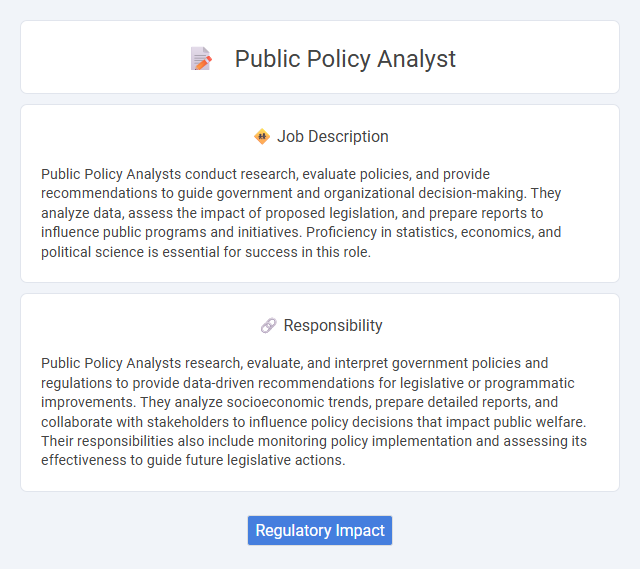
Public Policy Analysts conduct research, evaluate policies, and provide recommendations to guide government and organizational decision-making. They analyze data, assess the impact of proposed legislation, and prepare reports to influence public programs and initiatives. Proficiency in statistics, economics, and political science is essential for success in this role.
Individuals with strong analytical skills and a keen interest in social issues are likely to be well-suited for a Public Policy Analyst role. People who enjoy data interpretation, research, and crafting evidence-based recommendations may find this job rewarding. Those lacking patience for extensive research or limited in their ability to consider diverse perspectives might struggle in this field.
Qualification
Public Policy Analysts typically hold a bachelor's or master's degree in political science, public administration, economics, or related fields, emphasizing strong analytical and research skills. Proficiency in data analysis software, statistical tools, and policy modeling enhances their ability to evaluate and recommend effective policy solutions. Excellent communication skills, critical thinking, and knowledge of legislative processes are essential for interpreting complex regulations and influencing decision-makers.
Responsibility
Public Policy Analysts research, evaluate, and interpret government policies and regulations to provide data-driven recommendations for legislative or programmatic improvements. They analyze socioeconomic trends, prepare detailed reports, and collaborate with stakeholders to influence policy decisions that impact public welfare. Their responsibilities also include monitoring policy implementation and assessing its effectiveness to guide future legislative actions.
Benefit
A career as a Public Policy Analyst likely offers the benefit of influencing important decisions that impact communities and society at large. It probably provides opportunities to engage in research and data analysis to shape effective policies. The role may also offer professional growth through collaboration with government agencies, think tanks, and advocacy groups.
Challenge
Public Policy Analysts likely face challenges in balancing diverse stakeholder interests while interpreting complex data to inform decision-making. Navigating political pressures and rapidly changing regulatory environments may complicate their ability to provide objective recommendations. They probably need to continuously adapt their analytical approaches to address emerging societal issues and policy demands.
Career Advancement
Public Policy Analysts leverage data analysis and research skills to evaluate and develop governmental and organizational policies, driving informed decision-making. Career advancement often requires expertise in statistical software, strong communication abilities, and a deep understanding of legislative processes, enabling promotion to senior analyst or policy advisor roles. Pursuing advanced degrees or certifications in public administration, economics, or political science significantly enhances opportunities for leadership positions within think tanks, government agencies, and advocacy groups.
Key Terms
Regulatory Impact
Public Policy Analysts specializing in Regulatory Impact evaluate the effects of existing and proposed regulations on economic, social, and environmental factors to inform decision-making processes. They utilize quantitative methods and stakeholder analysis to assess policy efficiency, compliance costs, and unintended consequences, ensuring regulatory frameworks align with public goals. Their expertise supports government agencies and organizations in crafting evidence-based policies that promote sustainable development and regulatory transparency.
 kuljobs.com
kuljobs.com